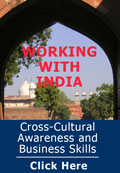

![]()
|
2010 Calendar of INDIAN PUBLIC HOLIDAYS CLICK HERE |
Navigating India’s Holidays
By Dr. Karine Schomer, CMCT President and India Practice Leader
![]() If you work with a global team in India, have been to India on a business
trip or are trying to manage large-scale operations involving India, you’ve probably been bewildered at all the holidays that seem to pop
up unpredictably to affect your well-devised plans and schedules. You may have been blindsided a few times too, learning about a holiday at the
last minute and having to scramble for back-up solutions upon learning that your India team has the day off.
If you work with a global team in India, have been to India on a business
trip or are trying to manage large-scale operations involving India, you’ve probably been bewildered at all the holidays that seem to pop
up unpredictably to affect your well-devised plans and schedules. You may have been blindsided a few times too, learning about a holiday at the
last minute and having to scramble for back-up solutions upon learning that your India team has the day off.
![]() Not long ago, I was presenting a “Working with India” workshop to a global IT infrastructure team in the United States. The team leader warned me that he and others would need to be in and out of the class: “I’ve just learned there’s some religious festival going on in Bangalore today, and we’re going to have to provide back-up coverage.” The “some religious festival” was, in fact, the main secular holiday of the state of Karnataka, marking the day on which the state had been formed, celebrated regularly on Nov. 1 since 1973.
Not long ago, I was presenting a “Working with India” workshop to a global IT infrastructure team in the United States. The team leader warned me that he and others would need to be in and out of the class: “I’ve just learned there’s some religious festival going on in Bangalore today, and we’re going to have to provide back-up coverage.” The “some religious festival” was, in fact, the main secular holiday of the state of Karnataka, marking the day on which the state had been formed, celebrated regularly on Nov. 1 since 1973.
![]() I’ve been surprised at how little Americans and others working with India tend to know about the holiday system within which their Indian counterparts operate. Indian holidays tend to be seen as an unfortunate nuisance impeding the flow of work. There is little interest in what they are, how they are observed, and what they signify culturally. It’s even rare to find accurate knowledge of Indian holiday calendars and for work with India to be planned around these calendars.
I’ve been surprised at how little Americans and others working with India tend to know about the holiday system within which their Indian counterparts operate. Indian holidays tend to be seen as an unfortunate nuisance impeding the flow of work. There is little interest in what they are, how they are observed, and what they signify culturally. It’s even rare to find accurate knowledge of Indian holiday calendars and for work with India to be planned around these calendars.
![]() The cost of this ignorance is considerable — in terms of work schedule disruption, unnecessary stress and also missing opportunities for using the recognition of Indian holidays as a tool for relationship-building and motivating the Indian teams.
The cost of this ignorance is considerable — in terms of work schedule disruption, unnecessary stress and also missing opportunities for using the recognition of Indian holidays as a tool for relationship-building and motivating the Indian teams.
How the Indian Holiday System Works (see 2010 calendar here)
National Holidays
There are three secular “national holidays”: Republic Day (Jan. 26), Independence Day (Aug. 15), and Mahatma Gandhi’s birthday (Oct. 2). These are observed everywhere in India, and all government offices and businesses are closed for these.
All-India Public Holidays
In addition to the three “national holidays,” there are 14 all-India “public holidays,” when all offices of the central government and banks remain closed. Of these, 11 are compulsory nationwide, and another 3 are decided upon on a state-by-state basis. In the spirit of India’s religious pluralism, these holidays include the festivals of India’s major religions (Hinduism, Islam, Christianity, Sikhism, Jainism and Buddhism). Most being scheduled on a lunar calendar, they come on different dates each year.
State Public Holidays
In each of India’s 28 states, there are additional holidays, both religious and secular. India is so regionally varied that no two states observe exactly the same mix of holidays and festivals. Different states have different regionally based Hindu festivals. A number of states celebrate the May 1 Labor Day. In Maharashtra, the Parsee New Year is on the list. In Punjab, there are a number of additional holidays relating to Sikhism. The state of Tamilnadu has a total of 24 public holidays. Each state issues a yearly list of its public holidays for the coming year.
Restricted Holidays
Another category of holidays is the so-called “restricted holidays.” These are holidays from which individuals may choose a limited number, though government offices and businesses don’t close. This system allows yet more flexibility for accommodating India’s religious and cultural pluralism.
Ad Hoc Holidays
Holidays may also be declared for ad hoc reasons such as the death of a respected national leader or for election days. Industrial strikes, especially the general strikes called “bandh,” can result in de facto work holidays as well. Finally, in cricket-mad India, there are the unofficial “cricket holidays” around major test matches, when employees are at work, but thoroughly distracted, or may even call in sick!
Getting Correct Information
You may have spent time searching the web for a definitive schedule of Indian holidays. You’ve no doubt been frustrated by the multiplicity of inconsistent lists. The problem is that you have to think regionally. If you deal with four different cities in India, each in a different state, there will be slight differences in the holidays observed.
![]() Because private companies have considerable latitude in selecting which holidays to observe, you also need to know what the holiday lists of the different companies are. And you should probably learn about these holidays the Indian way — not just finding somewhere to look it up, but by having people tell you personally.
Because private companies have considerable latitude in selecting which holidays to observe, you also need to know what the holiday lists of the different companies are. And you should probably learn about these holidays the Indian way — not just finding somewhere to look it up, but by having people tell you personally.
6 Quick Tips for Navigating Indian Holidays
![]() Tip #1: Understand the overall system and learn the specific holidays of the various Indian states and companies you deal with.
Tip #1: Understand the overall system and learn the specific holidays of the various Indian states and companies you deal with.
![]() Tip #2: Every year, build the relevant Indian holiday dates into your corporate and team calendar, and take them into account in your operational planning. Leverage to advantage the differences between the Indian holiday schedules and your own.
Tip #2: Every year, build the relevant Indian holiday dates into your corporate and team calendar, and take them into account in your operational planning. Leverage to advantage the differences between the Indian holiday schedules and your own.
![]() Tip #3: Build an “Indian holiday watch” role into your operational planning, so that you can be apprised of unplanned ad hoc holidays and can quickly recalibrate your work schedules.
Tip #3: Build an “Indian holiday watch” role into your operational planning, so that you can be apprised of unplanned ad hoc holidays and can quickly recalibrate your work schedules.
![]() Tip #4: In the holiday policies for your own employees in India, especially at a time of skilled labor shortage, recognize the motivational impact of allowing for the observance of important national and state holidays.
Tip #4: In the holiday policies for your own employees in India, especially at a time of skilled labor shortage, recognize the motivational impact of allowing for the observance of important national and state holidays.
![]() Tip #5: Through both reading and talking with your Indian colleagues, get to know the meaning, observances and flavor of the different holidays for those who celebrate them.
Tip #5: Through both reading and talking with your Indian colleagues, get to know the meaning, observances and flavor of the different holidays for those who celebrate them.
![]() Tip #6: Show recognition and appreciation of Indian holidays through occasional oral and email holiday greetings to your Indian colleagues. You’ll be surprised to find out how much this is appreciated.
Tip #6: Show recognition and appreciation of Indian holidays through occasional oral and email holiday greetings to your Indian colleagues. You’ll be surprised to find out how much this is appreciated.
© 2007-2010 Karine Schomer. All Rights Reserved. Permission to reprint granted provided the article and byline are printed intact, with all links visible and made live if distributed in electronic form.
Dr. Karine Schomer is President of Change Management Consulting & Training, LLC, and leads the CMCT India Practice, specializing in cross-cultural training and management consulting for doing business with India, competitive advantage through cross-cultural awareness, business etiquette and protocols, cross-cultural communication and teamwork skills, outsourcing management best practices, and offshore team leadership strategies. For more learning resources check the CMCT Articles Archive.
| Training Programs for the Skills You Need |
| See a complete listing of CMCT’s cross-cultural and global business skills training programs, in addition to those featured below. |
| For more information, contact CMCT, write to , or call 510-525-9222. |
For more information, contact CMCT, write to info@cmct.net, or call 510-525-9222.
Home | About CMCT | Consulting Services | Training Programs
India Practice | Technology Practice | University Practice | Health Care Practice
News & Events | Case Studies | Articles | Clients | Site Map | Contact CMCT
© 2002-2007 Change Management Consulting & Training, LLC. All Rights Reserved.



